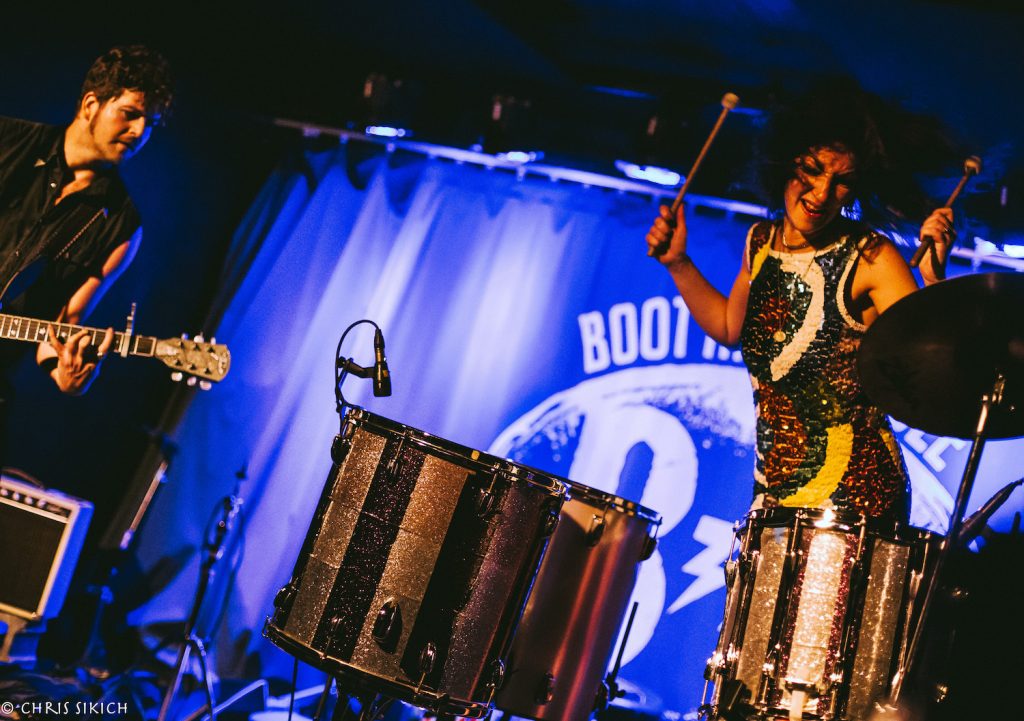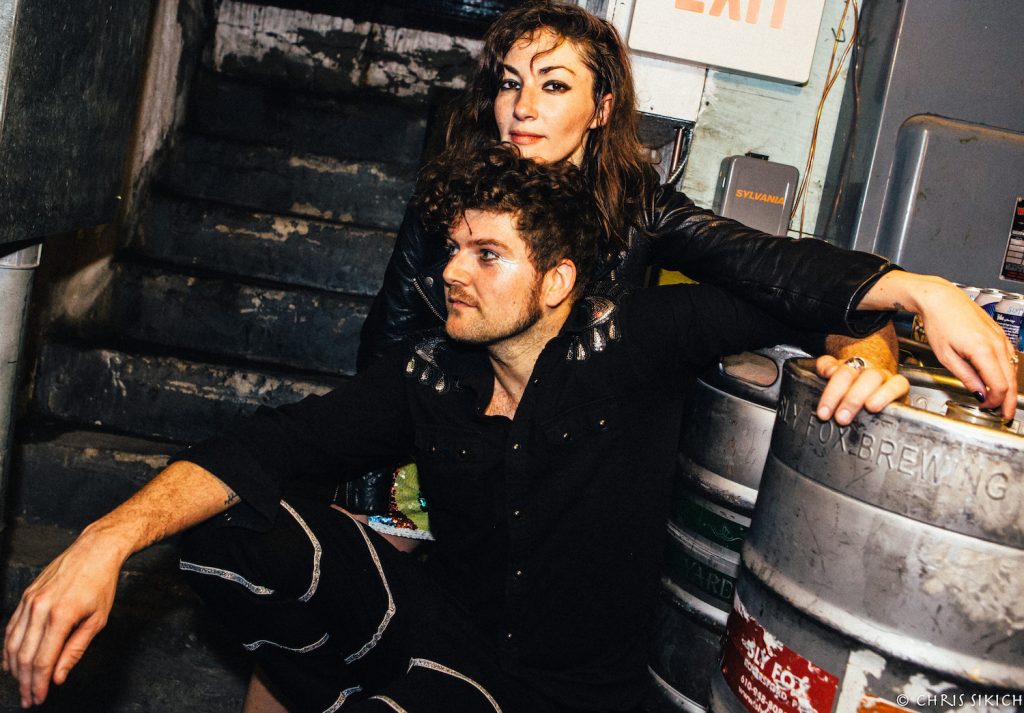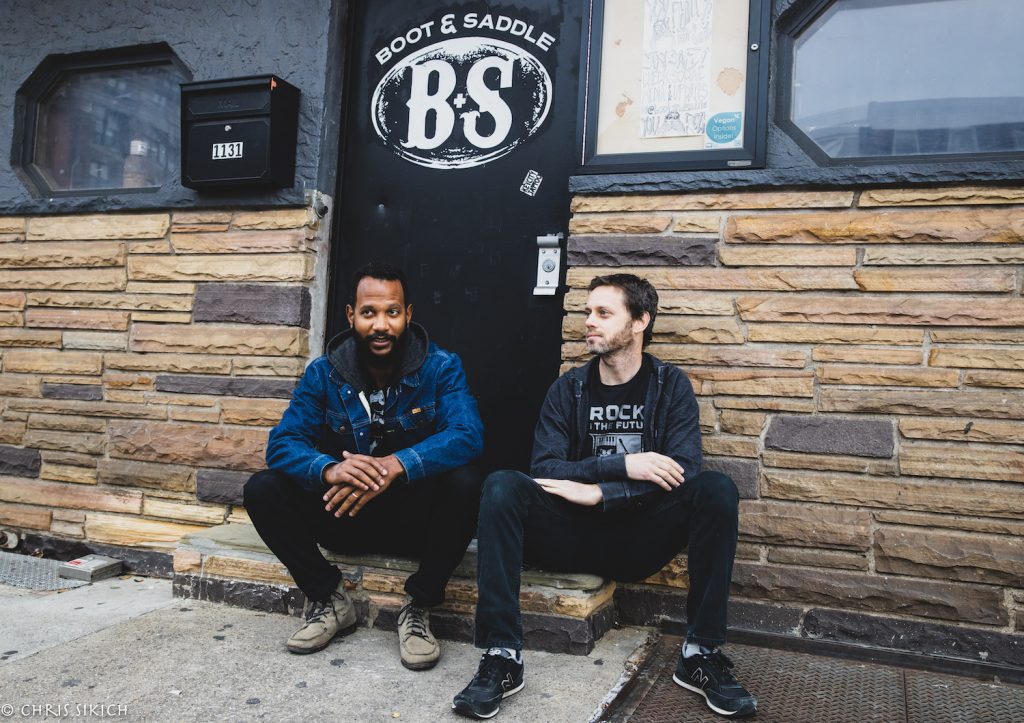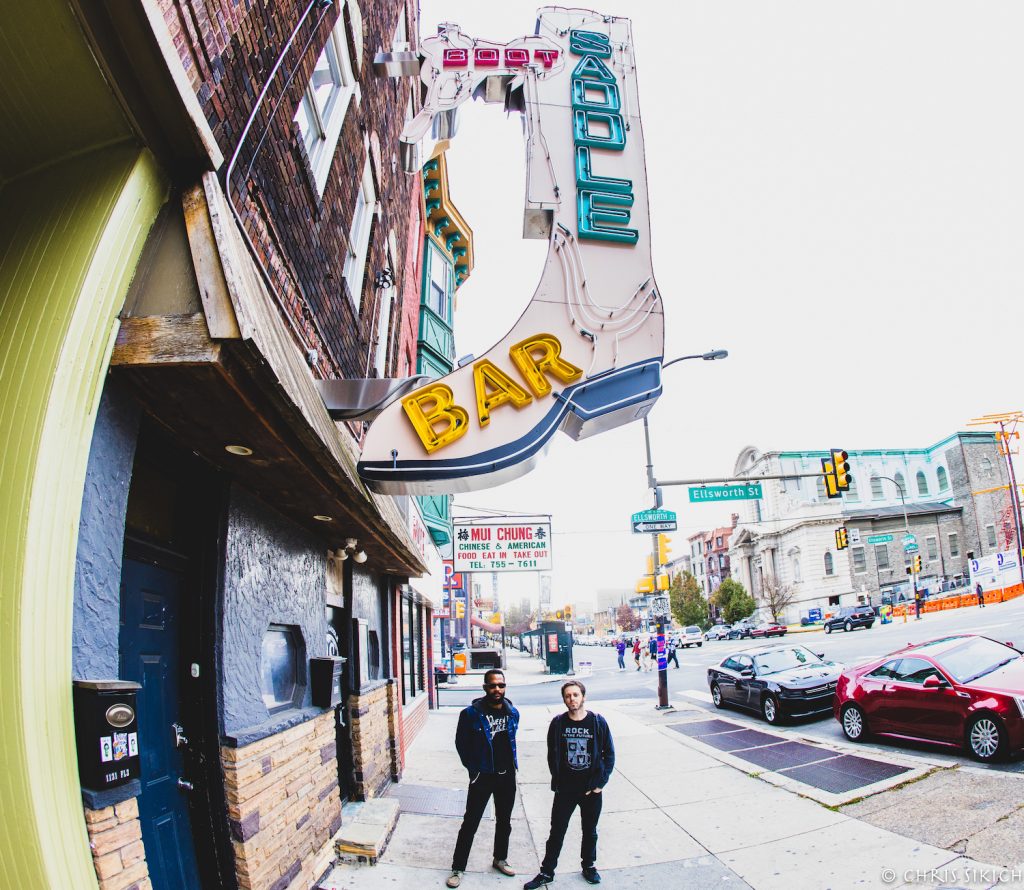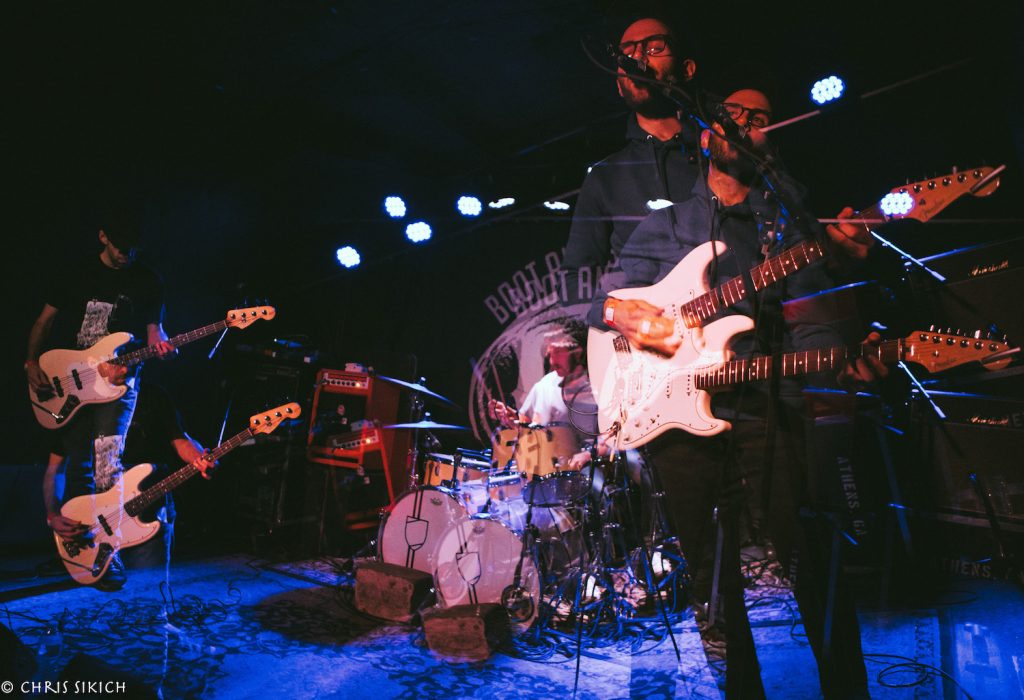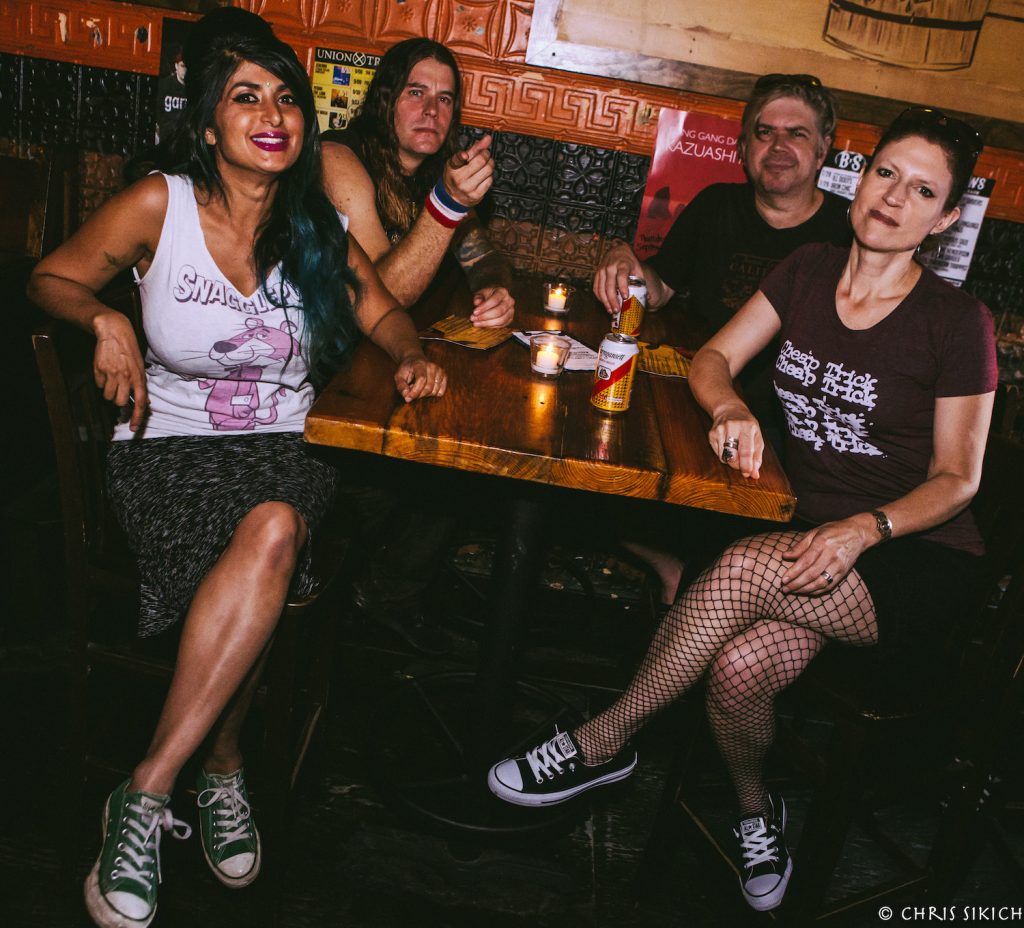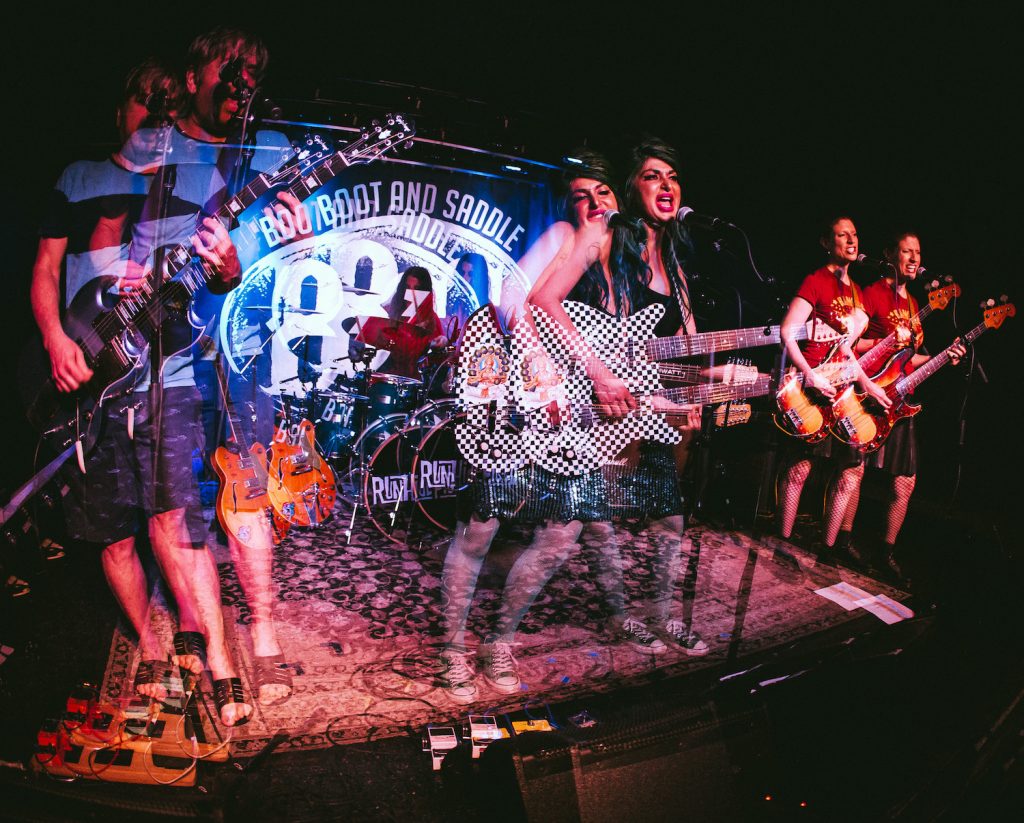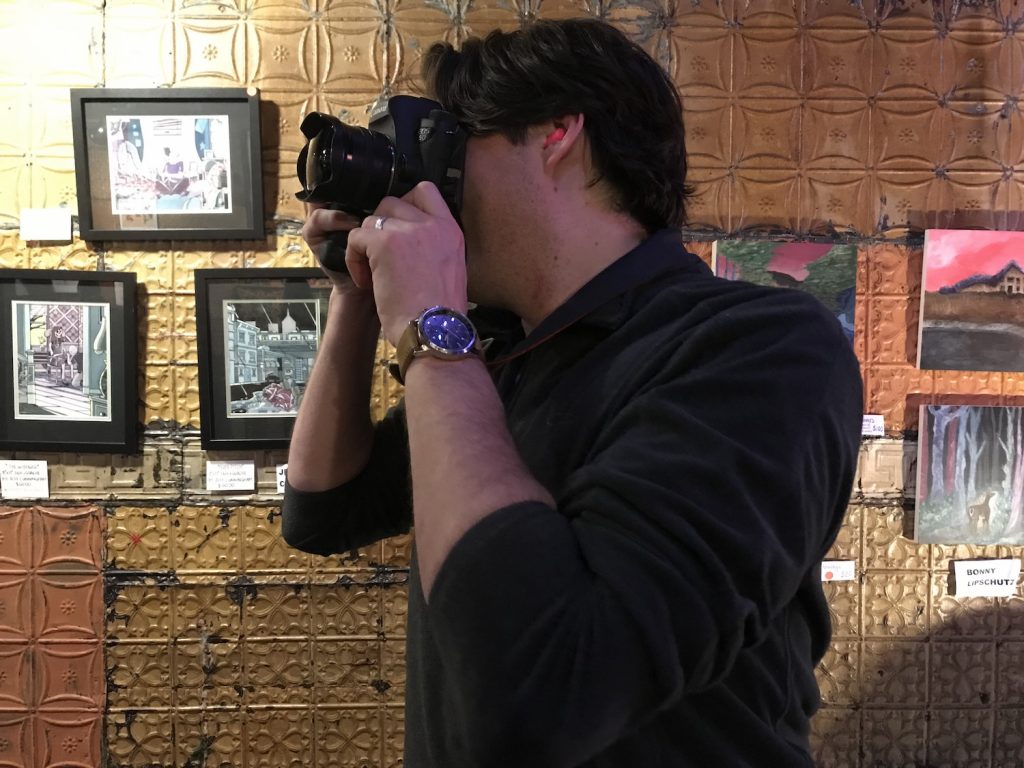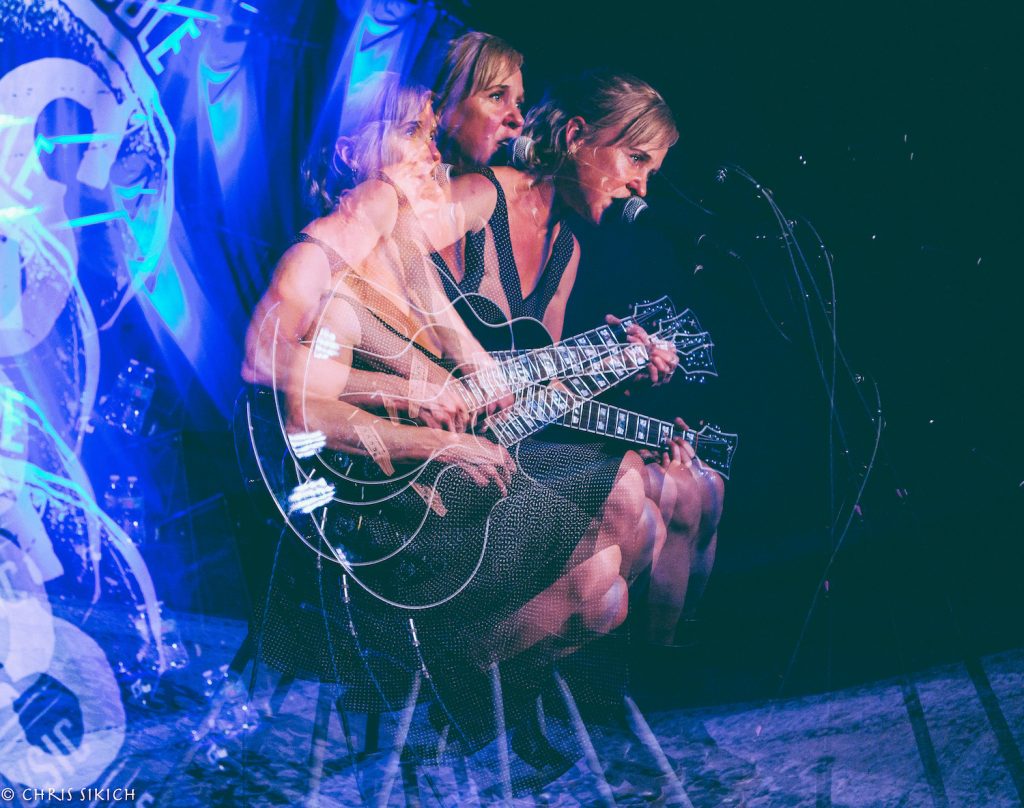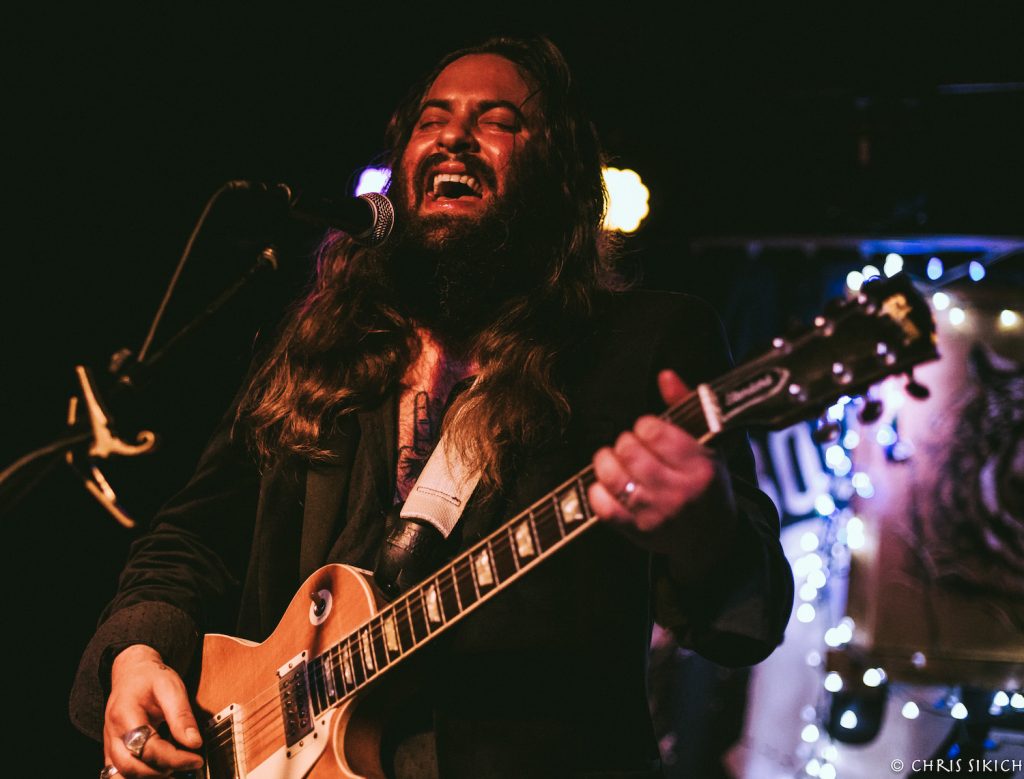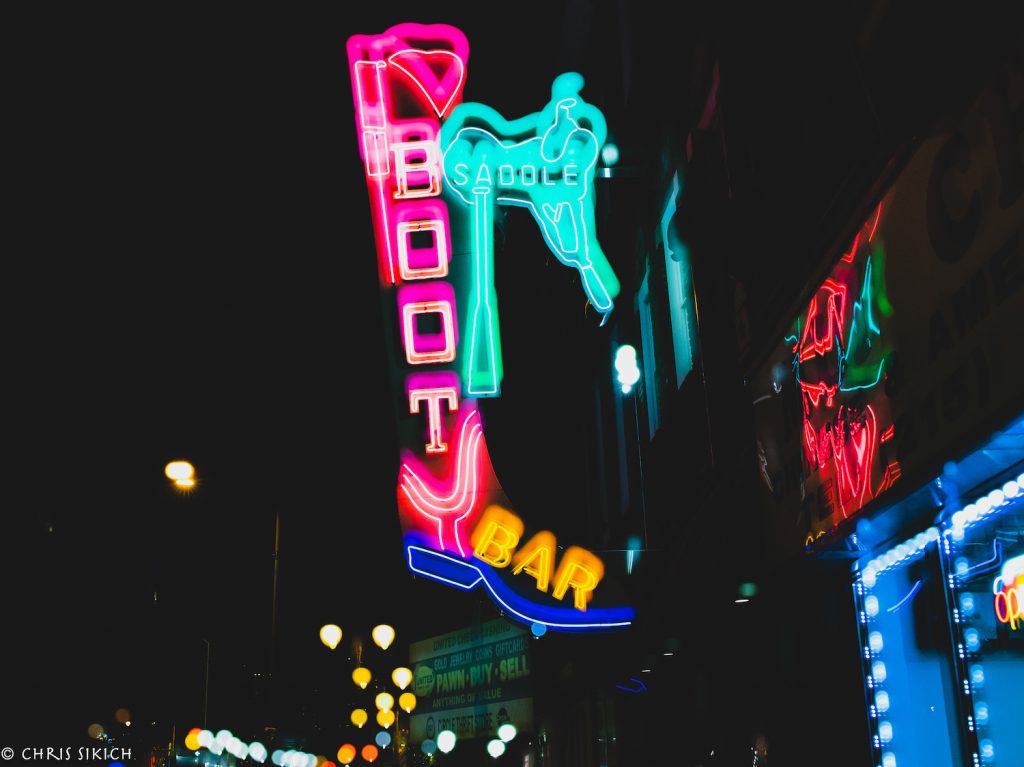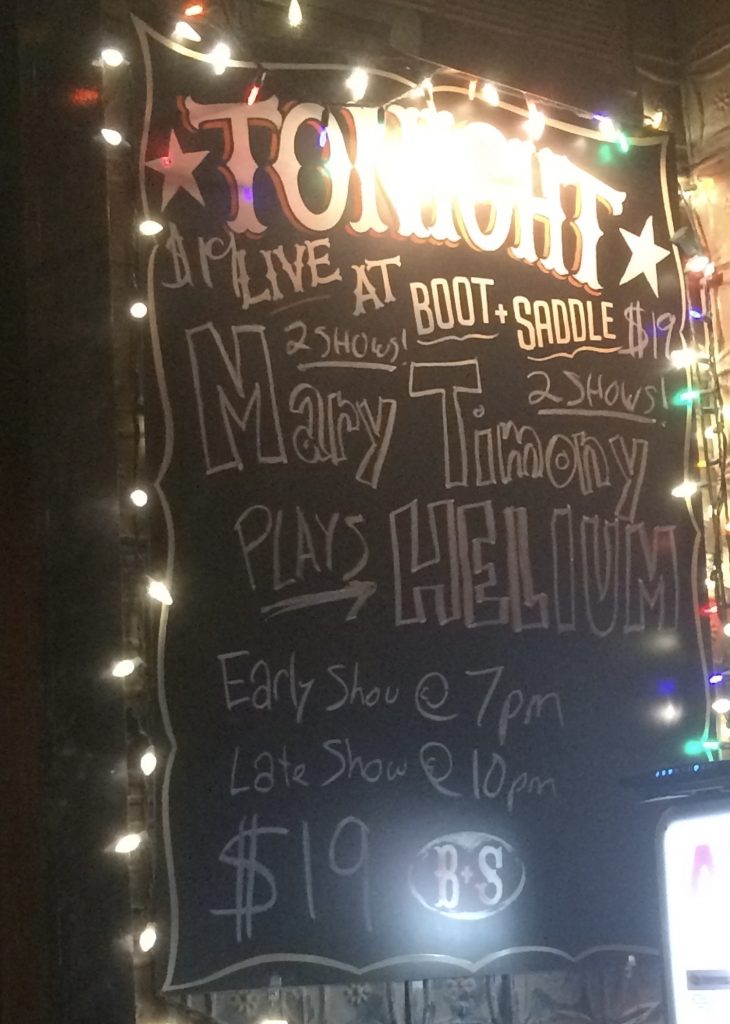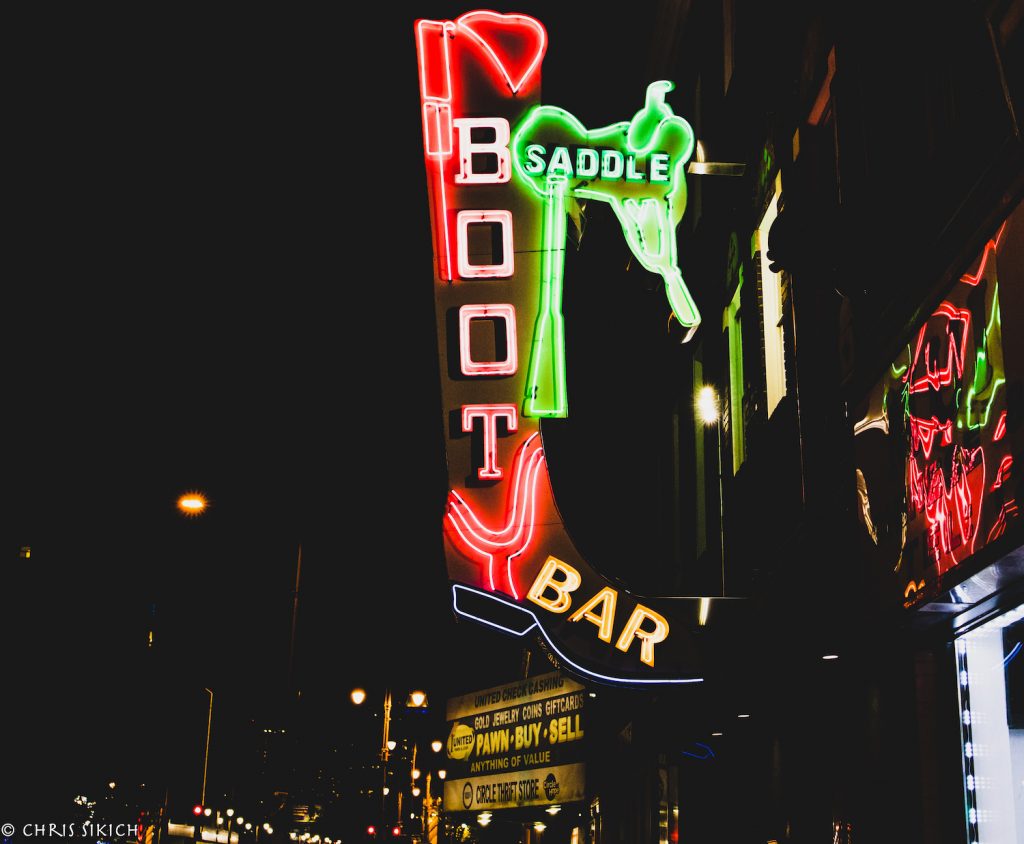
With our Isolation Drills series, MAGNET has been checking in with Philadelphia-area musicians to see how and what they’re doing during the pandemic. Now, we’re also shining a light on our beloved local venues, hoping their stages will be saved. Photos by Chris Sikich.
Unfortunately, while we were putting together this Where We Belong feature on Boot & Saddle, the South Philly space closed its doors for good. After seven years and more than 1,500 shows, this beloved indie-rock institution became our city’s first music venue to fall victim to COVID. The decision to close B&S was made in the hopes of keeping its sister venue, the larger Union Transfer, going after things return to normal.
In tribute to this magical spot on South Broad Street, MAGNET asked friends and family of the club to share their favorite B&S memories.
Q&A with Boot & Saddle general manager Gina Piccari
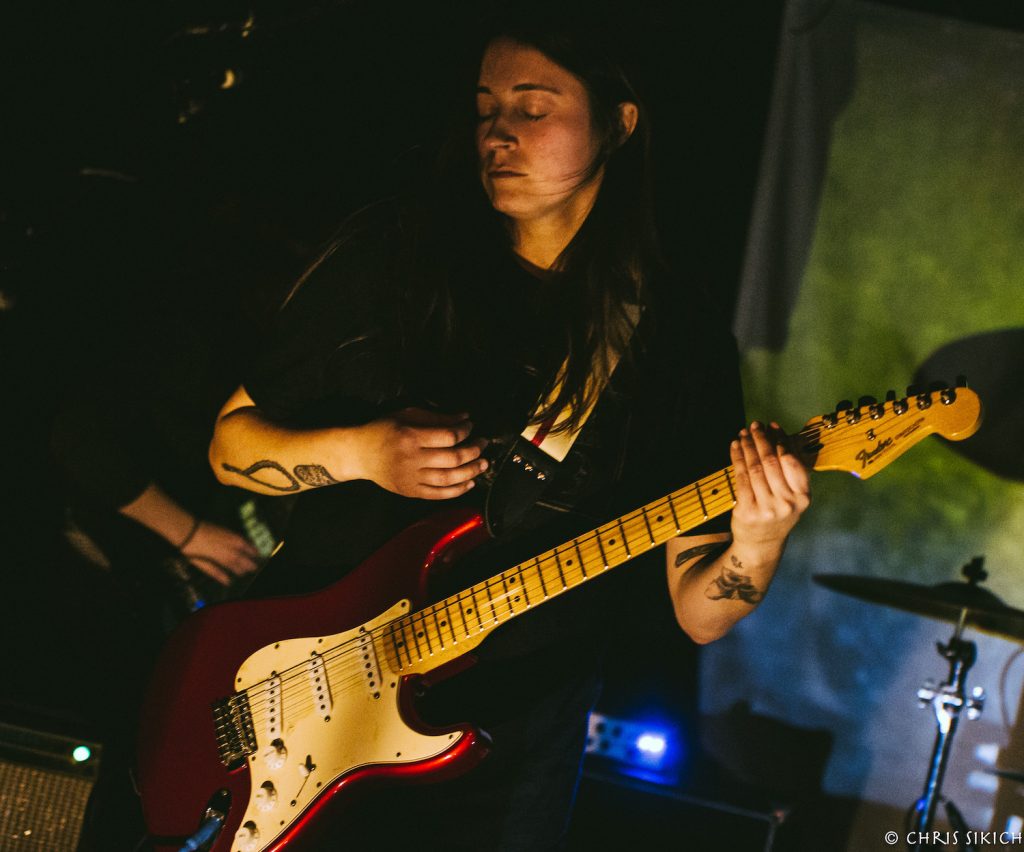
What did Boot & Saddle mean to you?
Piccari: Everything. Community, music, art, entertainment—home. It taught me something new every day. I met some of the most unique, talented, amazing people there. It opened my mind to different types of expression and art. It was really a safe, special place to me and so many others. I have no words to express how crushed I am by all of this. The closing of Boot will leave a huge hole in my heart that will be pretty impossible to refill.
What did Boot & Saddle mean to Philadelphia?
Boot was a huge staple in this city for local and touring bands. We were very passionate about keeping the calendar balanced with local bands and touring bands. We wanted it to feel like home to every band that came through and played Boot’s stage. Having a venue that size with the pull of R5 (Productions, longtime indie show promoters) behind it really paved the way for these bands to move up and eventually play larger rooms in the city. It was so cool watching a band come in and sell out Boot, and then a year later they were selling out Union Transfer. It was so cool to see that happen for so many bands that played our stage.
What is your fondest memory?
This is a really hard one. There’s a lot of fond memories. From when the sign got redone and hung, to the Eagles Super Bowl parade, to when PUP played New Years Eve, to when Nothing set off fireworks in the middle of Broad Street after their record-release show, to when Circa Survive played a secret show and Anthony Greene had to crowd surf his way out of the venue in order to get out after their set, to being able to throw charity shows with huge bands like Sheer Mag and Tigers Jaw, to when Japandroids played four consecutive sold-out shows and hung out with us all night and told us crazy stories of past tours they did. The list could go on, and I can’t pick just one.
How does the closing of Boot & Saddle affect Philly’s music scene?
I think it’s going to set off a domino effect of more and more places across the country announcing that they need to close as well, leaving the small independent venues as a distant memory, paving the way for public promoters to then monopolize and take over the music scene. (Especially here in Philly.) It’s my biggest nightmare. My hope is that after all of this (whenever that is), the independent music scene can take a deep breath and find its roots in DIY small spaces and work back up to turning those into small independent venues again. Philadelphia makes it pretty hard already to have an art/music space, so I hope that when things turn around, the city will ease up a little and let us resurrect out of our six-feet-deep graves from the pandemic with ease and open arms. Maybe one day … This isn’t just happening to Boot. This is something that every independent venue around the country is suffering with. NIVA (National Independent Venue Association) is an amazing organization to follow. They are trying to get congress to pass a stimulus bill to help independent venues. These venues are going to need years to recover from this, even after they are able to reopen. Independent venues and promoters are crucial in keeping the independent music scene from getting eaten alive by the big corporate promoters. I wouldn’t wish what my staff, bosses, friends and I went through on anyone. Our hearts are shattered and broken not only for our jobs, but for the local music scene and the music industry.
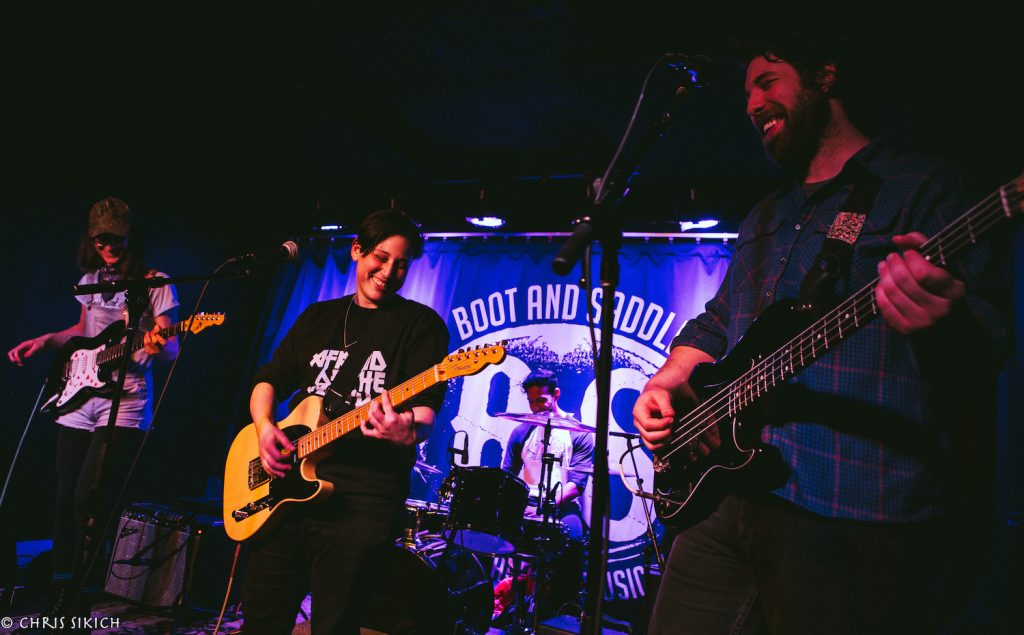
Mal Blum
It was a great spot. I guess I would just emphasize that small- to mid-size independent music venues are really special spaces to see live music, and it’s disheartening to watch so many of them closing. If all the independent spaces close, it’s possible that all the venues will be owned by one or two companies that will have a monopoly.
And the size of Boot & Saddle fulfilled a need, too. A lot of your favorite independent touring artists can bring out 100-200 people in a city like Philly. It’s a weird size for many venues to host when you’re too small for 500-plus venues but too big for, like, a coffee shop or small DIY space. There are usually just a handful in every city. Spaces small enough where you can see shows that feel intimate, but big enough where the artist can sell enough tickets to keep touring.
Will Brown (Astronaut Jumpshot)
Getting the chance to play at Boot & Saddle a handful of times was so special to me. I remember my first time there, I saw Julian Casablancas and then got to play on the same stage a few months later. Having a venue that’s equally fit for national touring acts and local acts alike is vital to any music scene. I’m so sad to see it go, and I urge everyone who can to offer financial and emotional support to its staff and the staff of other venues who are just barely getting by right now. We need them!
Ali Carter (Control Top)
Boot & Saddle holds a host of dear memories for me and will be sorely missed. One of the first shows I went to after moving to Philadelphia in 2014 was Mutual Benefit at Boot & Saddle. It was a union of the life I left in Boston, where I got into DIY and discovered bands like Mutual Benefit, and a new life beginning in the city that’s always been closest to me, especially in terms of live music. Growing up, I’d travel an hour with my friends to go to shows in Philly, and had Boot & Saddle existed when I was in high school, I would have certainly been bummed not to be old enough to go there.
Boot & Saddle was part of an ever-evolving ecosystem of basements, lofts, warehouses, art galleries, bars, record shops and other intimate spaces where local bands could test out material and mingle with touring acts and folks in the community. A place where music fans could connect. I could always shell out some cash for a show there, and I’d often run into a friend at the bar or the gig. I met Al (Creedon) at a Telepathic show at Boot & Saddle in 2015. A few months later, I recorded my first songs at his studio, and a couple years later, we started playing music together.
Control Top had some cool opportunities to open for bands at Boot & Saddle in 2018 while we were making our first LP, Covert Contracts. I remember being so excited to perform with the recently reunited Red Aunts, a legendary Long Beach punk band who released a number of excellent records on Epitaph in the ’90s, introduced to me by my friend, artist Kelly Kieth. Red Aunts delivered an electrifying performance, and it was an honor getting to share the stage with these fierce women, who also loved to scream and rock out. It was the last Philly show Red Aunts would play before the untimely death of their dear vocalist/bassist, Debi Martini, in January the following year.
Right now there is a nationwide effort to #SaveOurStages being led by the National Independent Venue Association. Please help pressure Congress to act before more venues like Boot & Saddle close!
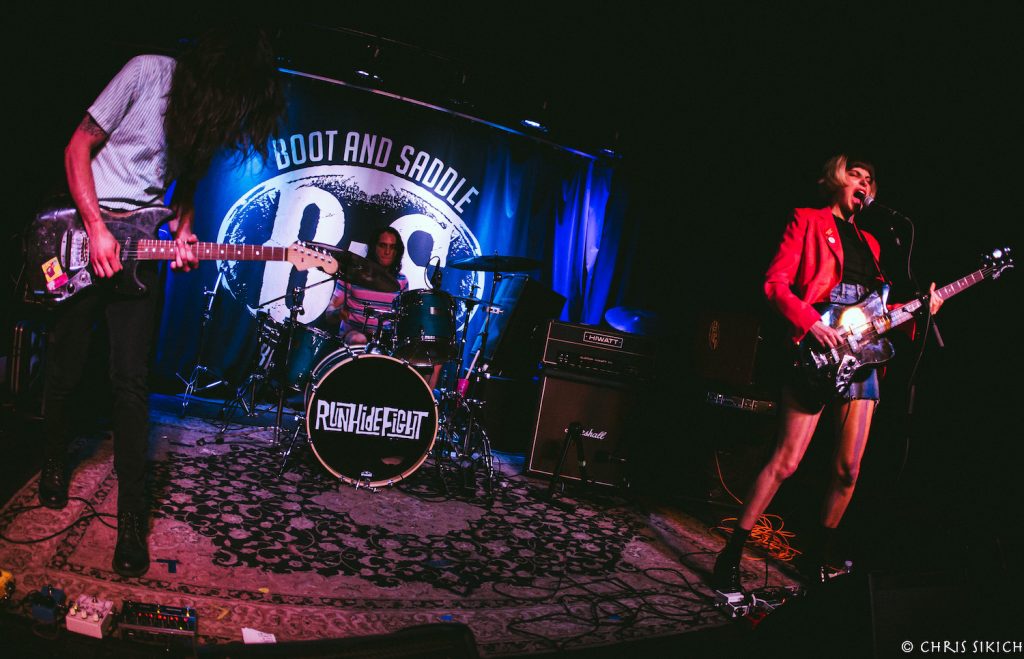
Katie Feeney (You Do You)
Boot & Saddle was the number-one Philly venue I did not want to lose, and seeing it go first was a punch in the gut for indie artists like me who fear the impending Live Nation/AEG takeover will leave us behind. Two stories about the venue that stand out in my memory:
Spring 2014: You Do You’s second show at Boot & Saddle was as support for Jessica Hernandez & The Deltas. I am loading in with my (otherwise all-male) band through the bar, and I’m already in full-show drag, wearing a sequin romper, hair and makeup done. A dozen or so very drunk men from “the Old Philadelphia” are hovering at the end of the bar, and as I’m lugging a merch box, I’m greeted by whistles, leers and shouts of “Take your top off!” I enter the back room noticeably upset and very riled up. Steve, the sound guy, asks me what’s wrong, and when I tell him, he immediately kicks all of them out of the bar, no questions asked. I overhear him tell them they aren’t welcome in the bar anymore if they’re going to treat the talent like that. Multiple staff members ask me if I am OK. This was one of the first times I really felt respected as a female artist in Philly, after having other venue managers approach me and say things like, “Sorry, no girlfriends,” when I would be setting up the merch box before a gig for my band. We never had a bad sound engineer at Boot & Saddle, and we never had a bad experience with the staff. We always got taken care of there.
Summer 2018: By the grace of Jeff Meyers (who I will never forget for this and for the dozen of other times he believed in and booked me for this great room), I got to support my favorite singer, songwriter Maggie Koerner, and debut my solo act, Roberta Faceplant, to a packed house. I saw Maggie was headlining and launched a prayer of a booking request to Jeff, who readily booked me as support to debut my new solo act. (Which I was not ready to debut necessarily until I got that yes.) I only had like one or two new songs written at that time. But honestly because they believed in me, I did, too, and I got to writing. That first solo show is one of my proudest memories—one of the best shows and frankly best days of my life thanks to everyone at Boot & Saddle.
Madalean Gauze
This past year, I have been attempting to adjust and maintain a sense of reality with all the changes that occurred. Trying to remain afloat during this time can consequently result in losing yourself and the life you once knew. On November 7, my partner and I decided to explore the streets of Philadelphia for the first time in months to safely celebrate and rejoice in the election results. My heart was full witnessing people outside together, celebrating hope and not despair. I forgot that this city could be so unapologetically alive.
While walking home on Broad Street, my partner and I passed by Boot & Saddle. I felt a tug at my heart and a need to pause and discuss the people who worked within the venue. We passed by the venue on a busy sidewalk on an uncomfortably hot November day. As we were surrounded by people joyously dancing, car horns and loud music, I blindly remarked, “The people who work there, they could have worked in cubicles or gotten degrees. They would be fine right now working from home, but they took a risk.”
When I found out Boot & Saddle was closing, I felt a wave of emotions. In a way, it felt nice to reminisce with friends about our shared memories within the venue, but ultimately my focus went to the employees. I believe that no matter what, music will always exist and artists will always create. When a special venue like Boot & Saddle closes, it means those who work within it once again need to hustle. I know ultimately those who called Boot & Saddle a home will find stability because one has to be tough to endure the life of a creative risk taker. However, I do want to say that I am sorry that this is another challenge coming your way this year.
I want to express how thankful I am to the employees of Boot & Saddle. As someone who was typically labeled a weirdo or loner, I spent most of my life quietly playing music alone in my bedroom. I never thought that I would one day get the chance to play live at a music venue like Boot & Saddle. Thank you for welcoming me, cheering me on and supporting me.
Jesse Gimbel
Boot & Saddle was an example of what a smaller-cap venue should be. I saw other venues reformat to imitate Boot & Saddle after they opened. Unlike many small venues that provide a stage and little else to lend success to their shows, Boot & Saddle had great sound, promoted their shows and had an expected level of quality of acts you’d see there. This made it both a great place to play as a musician but also a solid place to see shows. I have a lot of great memories of fun, crazy nights there.
Having a customer base that knows they can go to a venue most any night and see a great show is a key to a venue thriving and being a legitimate part of the music scene that serves a role between DIY spots, smaller venues and opens mics (which serve as entry points for musicians starting out) and the big venues (exclusive to large, nationally touring acts). The local music scene depends on this type of venue to survive and work their way up to bigger and better audiences, and it’s truly heartbreaking to see such a model example go.
Brendan Johnson (Stella Ruze)
Our CD release at Boot & Saddle was Stella Ruze’s last Philadelphia show before the pandemic. That night, as we all crammed onstage in front of a packed house of screaming, sweaty fans, we could feel the energy pulsating through the room. It was a culmination of all the blood, sweat and tears we have put into this group over the last six years. Boot & Saddle was one of the highest rungs on the local venue circuit. We were honored to get a Saturday night in the dead of winter, and we made sure to turn out so we could get invited back. Good sound, good food, good people. In summation, this totally blows.
Rob Kolar (Kolars)
March 2 2018. Storms had been ravaging the East Coast so we left D.C. with plenty of time to spare—so we thought. Eight hours later after rerouting from closed bridges, fallen trees on smashed cars and police enforced road closures, we arrived at the Boot & Saddle three minutes before our set time. We burst through the door, ran our gear on to the stage and started to play. After the most intense and stressful drive day of the entire tour (and our lives), we hit that Boot & Saddle stage and escaped all of the woes of the day with the cheering Philly crowd.
We will always remember this venue with love and fondness. The cool divey bar, the basement green room, the friendly sound guys and the supportive audiences we experienced time and time again.
Venues like this are absolutely crucial in the music world because they give opportunities to touring bands and young talent building their name. Thank you, Boot & Saddle, for the wonderful memories and, even more, for being a staple in the touring circuit that helps developed the most exciting underground talent in American music.
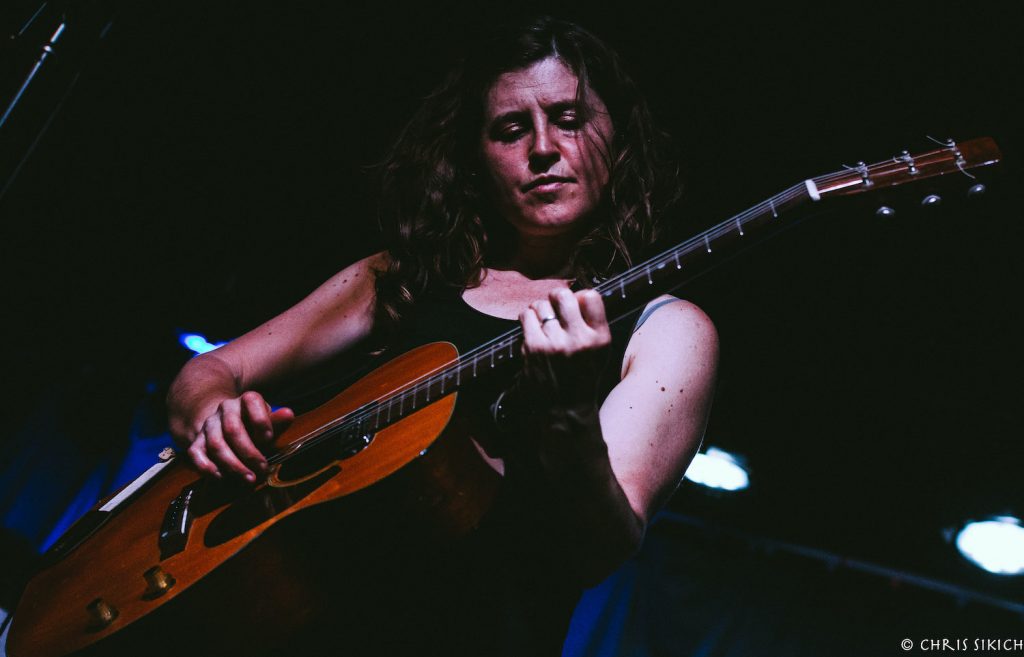
Mirah
My dad, Jay Zeitlyn, was born and raised in Philadelphia, and he and my mom raised my siblings and me just outside the city. My dad was an avid music lover, and my biggest fan. He would come to every single one of my Philly shows, from the time I started touring in the late ’90s until just before he died in 2018. I always loved playing at Boot & Saddle, and it was one of my dad’s favorites as well. It had such a relaxed and friendly vibe, and the sound was always great.
The last time I played there, in 2017 I believe, my dad came down to watch my sound check, and then we went for a walk down South Broad. We walked to Via Bicycle to say hi to Curtis, we walked by the vintage instrument shop in an old mansion, which Jay told me had once been owned by one of Father Divine’s churches. He told me stories, as he always did, about the Philly of his youth and all the amazing music shows he went to see.
We walked under the arching sky, which felt surprisingly western in its majesty that evening as we headed back down the long wide street. The sun dipped below the horizon, and the sunset glow was replaced by the weird light of gas stations and streetlights and stores. And then we walked back in to the Boot & Saddle for another cozy show, surrounded by friends and family and fellow music lovers.
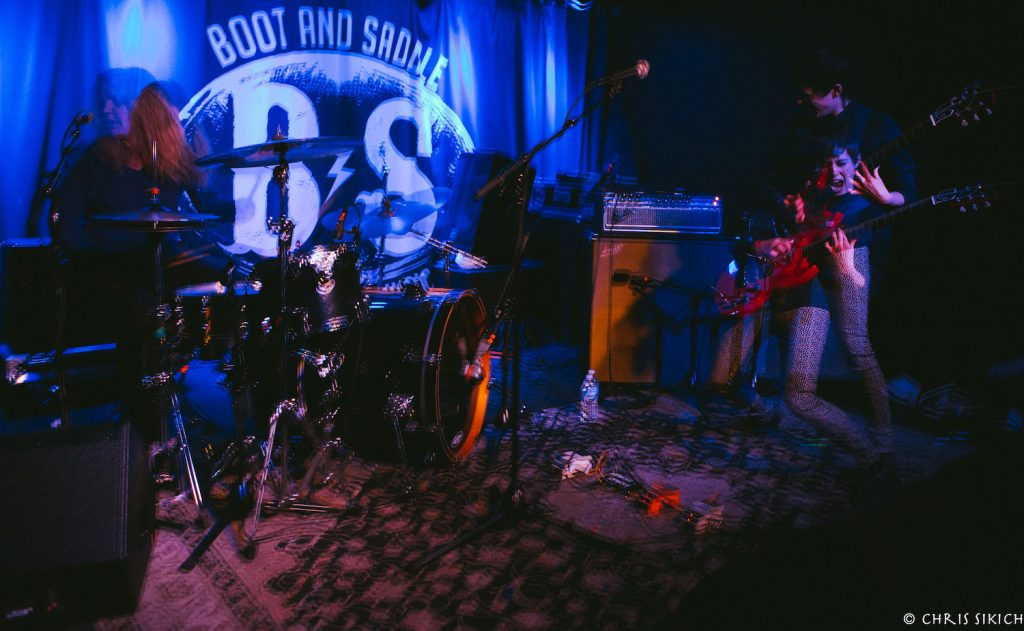
Katy Otto (Rainbow Crimes, Trophy Wife, Exotic Fever Records)
Boot & Saddle was not only my favorite venue in Philly but one of my favorite venues I’ve ever played in more than two decades of touring. Period. It had awesome sound and a wonderful staff, and it provided emerging artists with a high-quality platform to share their music. I’m devastated at its loss.
Red Touch Black
The small speakeasy windows. The raw ropes. The cowboy murals. The smell was clean but with a hint of history. Memories lived in this retrofit space and played with the hairs on my neck. The too-cool-for-school employees were actually cool. “This will be my home away from home,” I thought to myself, and I ordered my first of many beers.
The venue looked like the inside of a blackened sardine can. Surely, the acoustics would suffer. But then … lows, highs, mids, vocals, volume—everything holding its own in the mix! What the?!
And so it was. Some things can’t be explained. They just are. Here and gone again, but never to be forgotten. Newer bodies of memories now mingle with the old. Boots, saddles, black jeans, tattoos, fresh sneakers. And I can always dream that brilliant boot will light once again and cast its welcoming glow on South Broad.
After all, it was reincarnated to begin with.
Matt Scottoline (Hurry)
The beauty of Boot & Saddle was the way it catered to everyone individually. For artists, there was accessibility and opportunity. It was never difficult to gain access to Boot & Saddle if you needed to put on a show or host a band coming in from out of town. The stage was comfortable and sounded great, and the staff was always friendly and hospitable. It felt both like a professional, top-tier venue, but also like a neighborhood spot.
For patrons, the space was really welcoming and, in my opinion, catered to the needs of the average person. It was air conditioned(!) and had great sound in the room, and best of all, the bar area was separated from the venue, so if your ears needed a rest, or you ran into a friend you hadn’t seen in a while, there was always a mellow, easy place to retreat to and catch up. That last point transcends all the others, I think.
For me personally, Boot & Saddle did feel like a neighborhood spot, even if you didn’t live in South Philly. Every single time I played there or went to a show there, I would run into so many friends, old and new. It felt like the kind of place you could just show up to any night, and you’d have a good time. To have that vibe in what was also a really well-run, clean, professional venue was incredibly rare. I don’t really see it being replaceable.
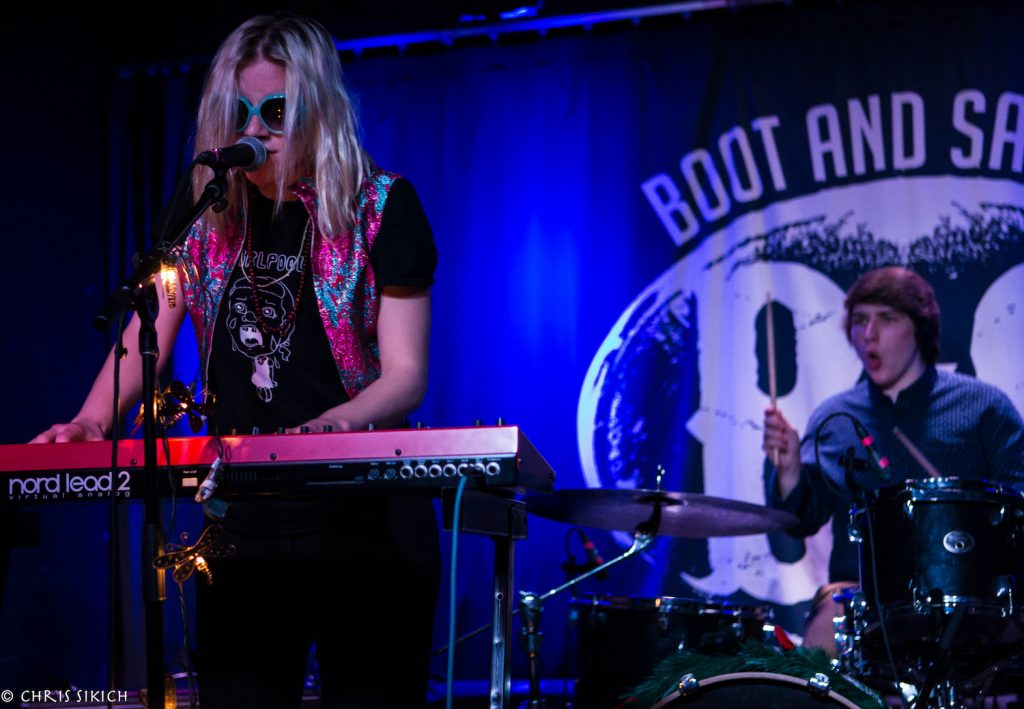
Adam Shumski (Vita And The Woolf)
Boot & Saddle was the home of many important shows for me: The first gig I ever played with Maitland, opening for Kwesi K. The last show I ever played with my college-era band Family Vacation. Rosu Lup’s 2019 album release. Some of the most fun gigs I’ve ever played with Vita And The Woolf, sharing the stage with Bell X1, Mal Devisa and Work Drugs. A lot of good music happened in that room. It’s sad, yet not surprising, to see more working people suffering at the hands of an economic system that doesn’t guarantee employment, housing or comprehensive medical care—especially during a pandemic such as COVID-19. I’ll be looking back on these memories for some time to come. To all the people who made Boot & Saddle so special: Thank you.
Geeta Simons (RunHideFight)
A year after I moved here to go to Penn, I joined my first Philly band. The other woman in the band was a waitress at Boot & Saddle. I remember the first time that I went to meet her there before practice; I was immediately mesmerized by that iconic neon sign.
Many years later, I found myself beneath its glow and under its spell again. Boot & Saddle was a venue that welcomed me back to the stage, gave me a chance again after more than a decade of not playing live music. The venue embodied such authenticity. Participating in a live gig there—whether onstage or in the audience—one could attest to its ability to transform time and space. Once those doors closed behind you from the bar, the rest of the world melted away. And stepping onto that room, I felt like it knew me; it felt like an old friend.
And speaking of those, I saw many an old friend’s band grace that stage, and many a teen hero as well. At 15, did I ever imagine that I’d be standing five feet directly in front of Kristin Hersh throughout her entire set—watching her fingers on the frets with the intimacy of a house party, but with world-class sound? I never would have never dreamed.
At the same time it was very much a home of the new and now. I remember going to see my bandmate Brother JT’s gig and being greeted by the friendly familiar face of Amy O of Dark Thoughts, who was working the door. And another time, I remember glancing up mid-sound check to find Mannequin Pussy frontwoman Marisa watching us play; she worked there as well.
I’m so disappointed that the music community suffers this loss, and I hope beyond hope that there’s a way back for not just them but live venues in general from this devastation. Who’s gonna be left around to give anyone—new or otherwise—a chance, if we don’t rally together for them?
Laura Stevenson
I can’t think of a favorite moment. I just remember the shows there always being so warm and full of positive energy, and the crowds were always so happy to be there. Plus it sounded great and was just such a cool room. I am so so sad to see it go!
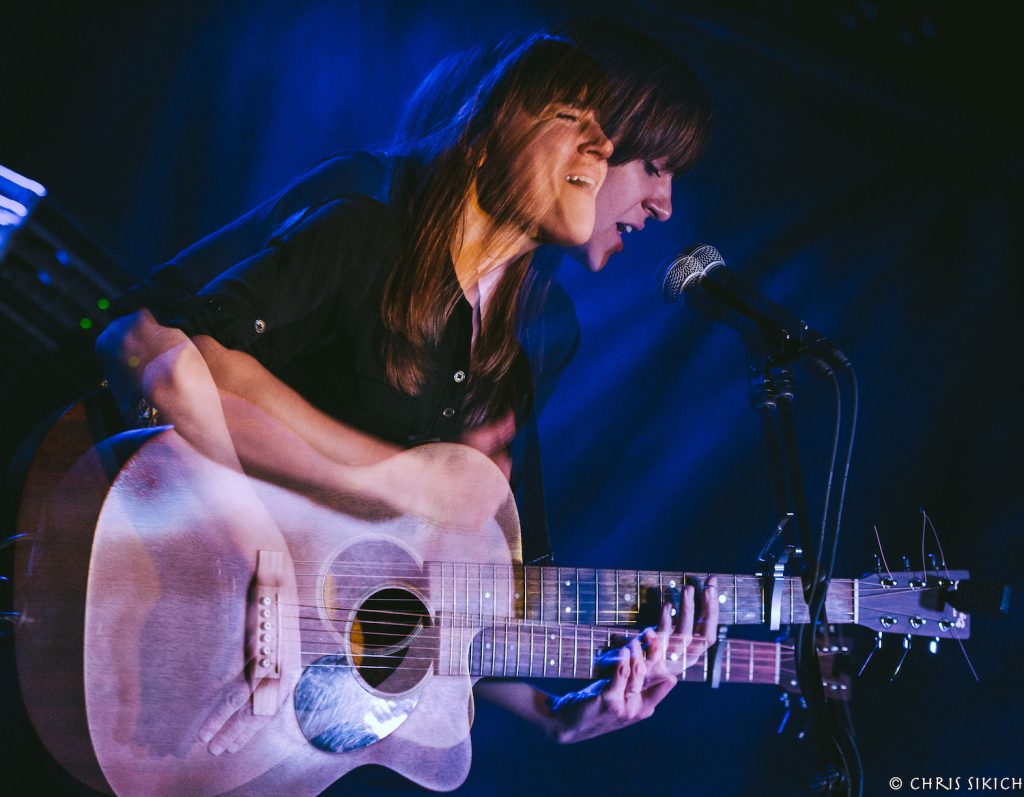
Laura Veirs
I always loved vibe of the room and how the packed crowd’s energy reverberated into every corner of it. The green room in the basement was tiny and right next to the boiler. It was sweltering! I won’t miss that part. So sorry to hear about the loss of this classic Philly venue.
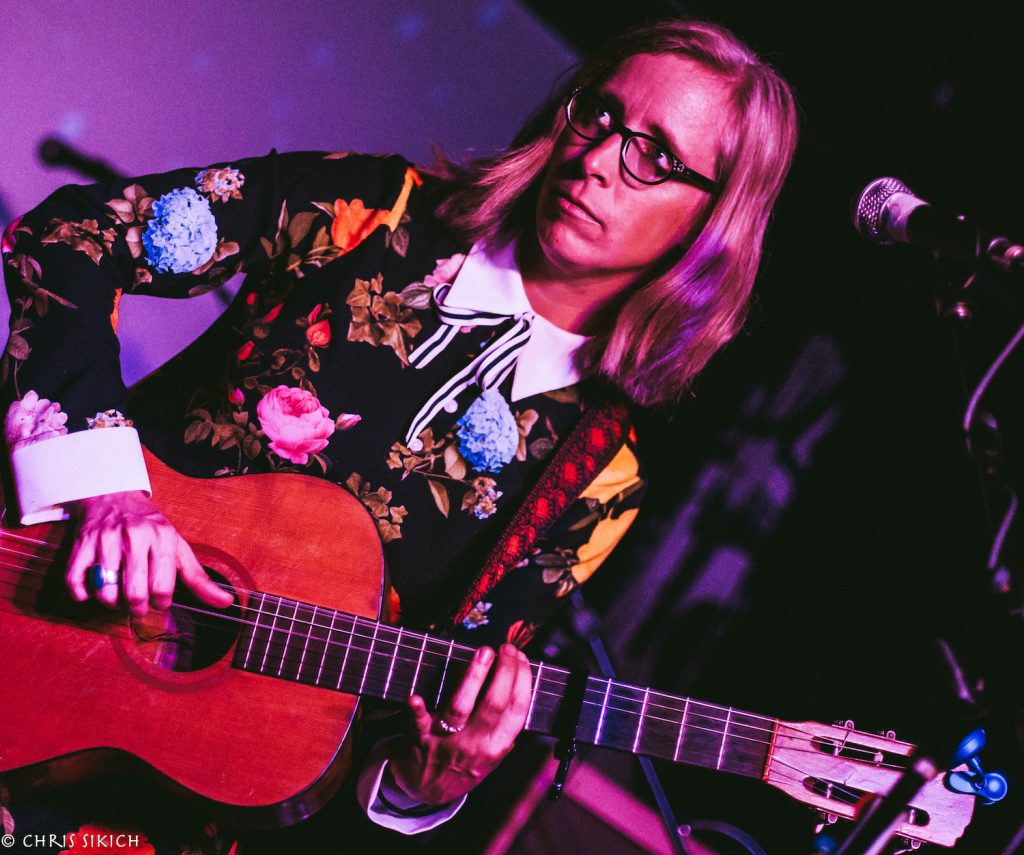
Chris Wilson (Ted Leo, Titus Andronicus, Hammered Hulls, Hound)
In January 2019, Hammered Hulls played our second-ever out-of-town show at Boot & Saddle. Separately, we’ve played thousands upon thousands of shows all over the world and most of us had already played B&S with some of our other bands: Mary (Timony) with Ex Hex and Helium; Mark (Cisneros) with the Make-Up, Beauty Pill and Kid Congo & The Pink Monkey Birds; me with Hound, Lantern and Ted Leo/Pharmacists. But when we as a band showed up that night, we were all super nervous. That nervousness didn’t last long. Everyone there made us feel right at home, and the place had a vibe reminiscent of Black Cat’s smaller venue Backstage that closed a couple weeks before. Despite having a decibel meter, the sound was perfect. Alec (MacKaye) said he could feel the volume in the floor of the stage. Much love to all who made this place so special. It will be missed.
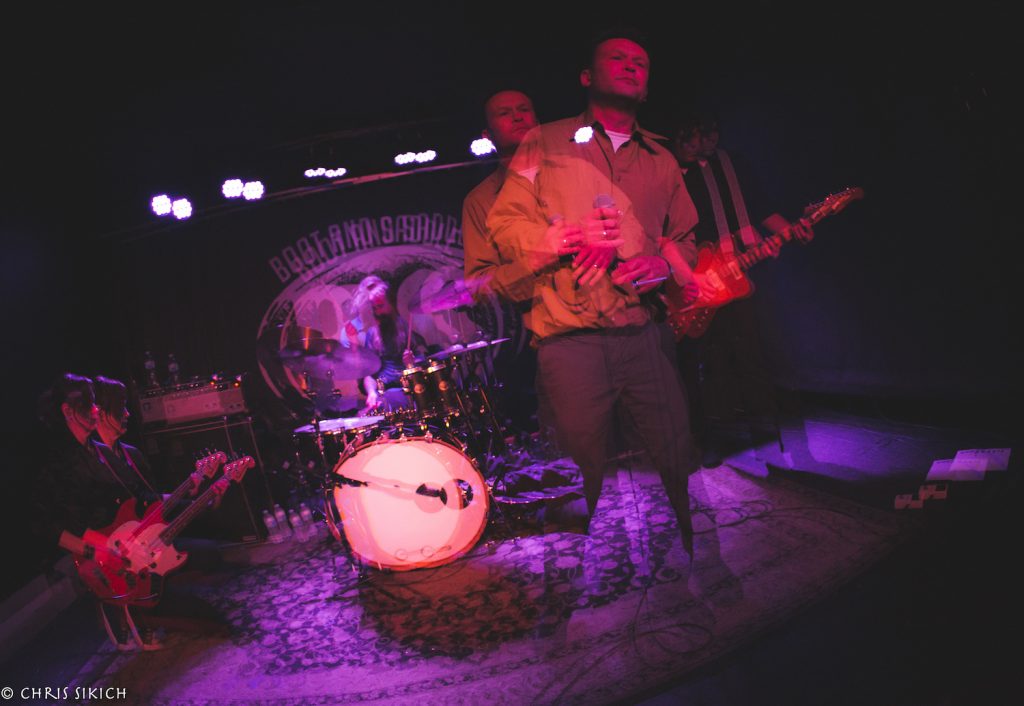
MAGNET photographer Chris Sikich on B&S
There was something so comforting about the long barroom. Entering it when few people were there, possibly band members, a few I was lucky enough to talk with or take portraits of. Definitely the great staff, sometimes ready with water, sometimes hanging back, letting you experience Boot & Saddle at your own pace. There were the tall stools, the vegan food (oh, how I have longed for a grilled cheese served early in their existence with mushroom “bacon,” something I can still taste from memory), the welcoming chalkboard with info on the night’s show. Doors usually opened at 7 or 7:30 and a hard curfew of 11; Boot & Saddle delivered a rare consistency and early night for those who needed to wake up early in the morning. And there were the tricks of sliding bathroom doors and not touching the venue’s walls too closely or else you might get snagged on the surface.
Where to stand? At 6-foot-1, I wanted to be on the sides, not blocking others, but sometimes it could not be avoided to be in the center. And the lighting, no frills, sometimes so dark that my photos would have to will light out of the darkness, leading me to other bouts of creative capture in double exposure. The stage, just a few inches off of the ground, put you right in the faces of some phenomenal acts. So many great, great shows. From my first (Lee Ranaldo in January 2014) to my last (a Valentine’s Day bash with locals Upholstery, Presages and Rainbow Crimes), I will forever feel the sweat of the sold-out nights and the expanse of the sound enveloping my soul. I will see crowdsurfers nearly kick the lights out during Amyl And The Sniffers. I will sense the guitar artistry of Juliana Hatfield and Mary Timony and wonder when the next tickets will go on sale post-COVID for a Strand Of Oaks residency.
But, that is not to be. There will be no more chances to be a few feet from a rock ‘n’ roll hall of famer like Clem Burke (who played there with the awesome line-up of the Split Squad) or to be caught up in the lush majesty of Anaïs Mitchell’s voice and lyrics, whether on her own or with Bonny Light Horseman. No more conjuring motion with my Canon, as I have with the likes of Kristen Hersh and Eyelids, or seeing the calm of a performer walk into the crowd as with Tokyo Police Club. No more waiting to experience the show with my wife or to speak with some concert friends I have met over the years.
The neon on the sign will go dim, and Philadelphia will have lost another a one-of-a-kind space for music, but the memories will ring on in our ears, our minds, our hearts.
MAGNET writer M.J. Fine on B&S
On the best nights, there was a magic at Boot & Saddle that couldn’t easily be replicated elsewhere: Alvvays, in one of their first U.S. dates, sounding even bigger and better than the buzz that preceded them. Those Darlins, in their penultimate performance, seeming indomitable. Strand Of Oaks, year after year at the Winter Classic shows that had been a highlight of the last five Decembers, transforming the depths of depression into life-affirming sing-alongs.
It was a place where you could find your favorite artists doing what they do and trying something new: Mary Timony proving equally adept as a hardcore bassist, new-wave power forward and indie-rock guitar hero in Hammered Hulls, Ex Hex and a Helium reboot. Katy Otto killing it on drums in Trophy Wife, Callowhill and Rainbow Crimes. Anaïs Mitchell revising folk standards with Bonny Light Horseman and diving into her own back catalog between album cycles. Mirah sharing a bill with her sister Emily Zeitlyn’s band Divers and sharing a stage with Jherek Bischoff and a string quartet. Kristin Hersh, electrifying both on her own and with her electric trio. Juliana Hatfield getting a jump on the Trump protest genre and getting the Juliana Hatfield Three back together for a romp through their Clinton-era classics.
There were Sonic Youth’s Thurston Moore and Lee Ranaldo, testing the limits of rock guitar by playing extremely loud and incredibly close—but at different times, in separate bands and in alternate musical dimensions. There were the Mekons, testing the limits of the stage, in terms of the number of players, length of set and force of personality. There was the Split Squad, blessed with boundless energy. Diet Cig’s Alex Luciano, crowdsurfing while playing guitar. Basia Bulat, with her seemingly endless arsenal of instruments you don’t always find at a rock club, like charango, autoharp and ukulele. Sir Babygirl, bringing most of the crowd onstage to dance with abandon. And Beauty Pill, exuding an unnatural calm.
It was a place where you could be among the first to see exciting new locals like Sheer Mag, Moor Mother Goddess, Hemming and Dreamswell and get a chance to catch late-career gigs from the Muffs, Red Aunts and Tommy Keene.
It wasn’t all great—I hated getting knocked to the ground by the lone guy slam dancing to a dull band, I was baffled by more than one critical darling, and I saw my share of forgettable openers. But the bruises and boredom are nothing compared to the sweat and elation I collected over the years. I’m deeply grateful I got to see as many shows there as I did, from the always captivating Laura Veirs in September 2013 (less than two weeks after opening night) to Upholstery’s doom-glam cabaret on Valentine’s Day 2020 (a month before COVID-19 sent everything crashing).
I’ll miss Boot & Saddle dearly. I already do.


